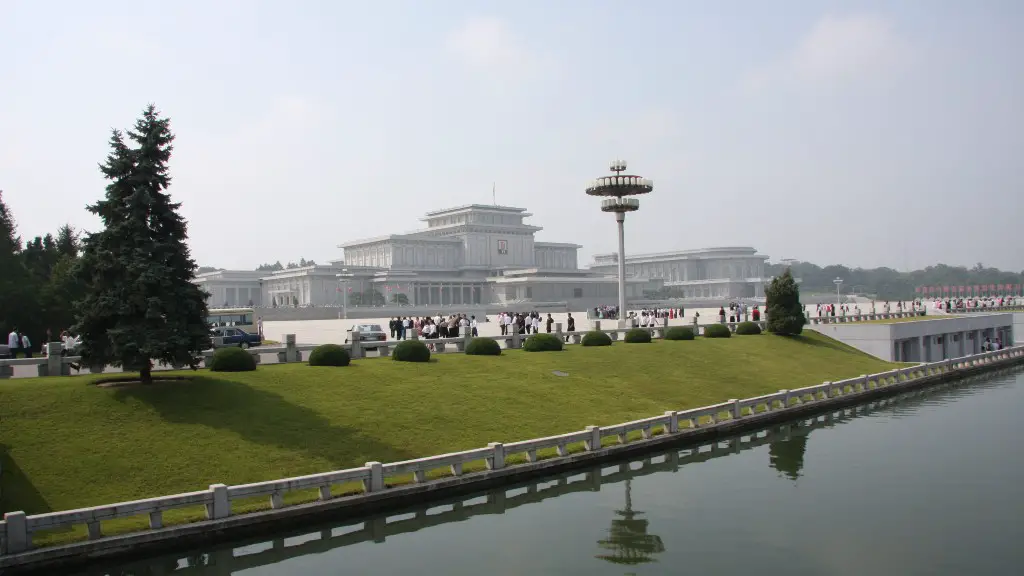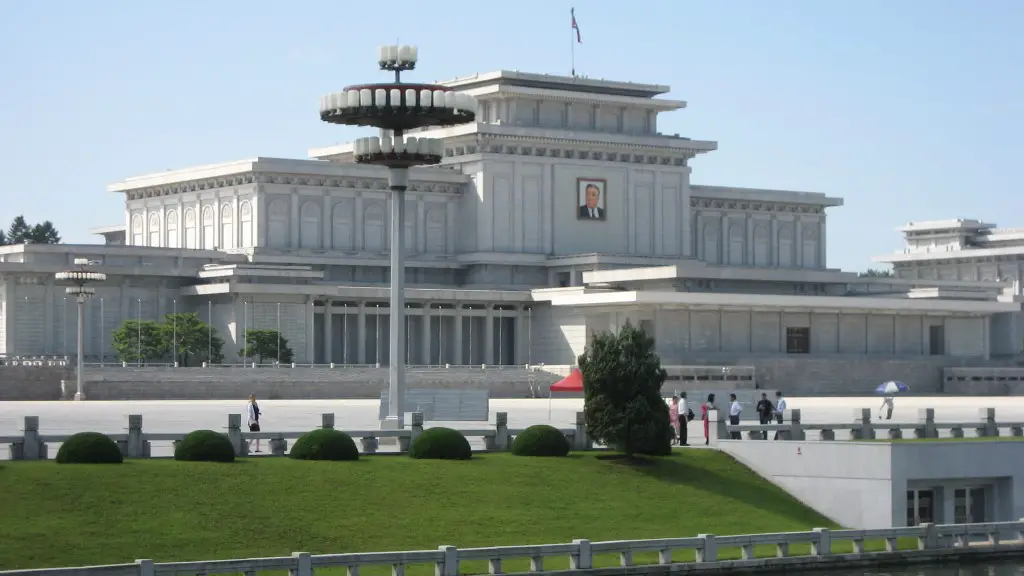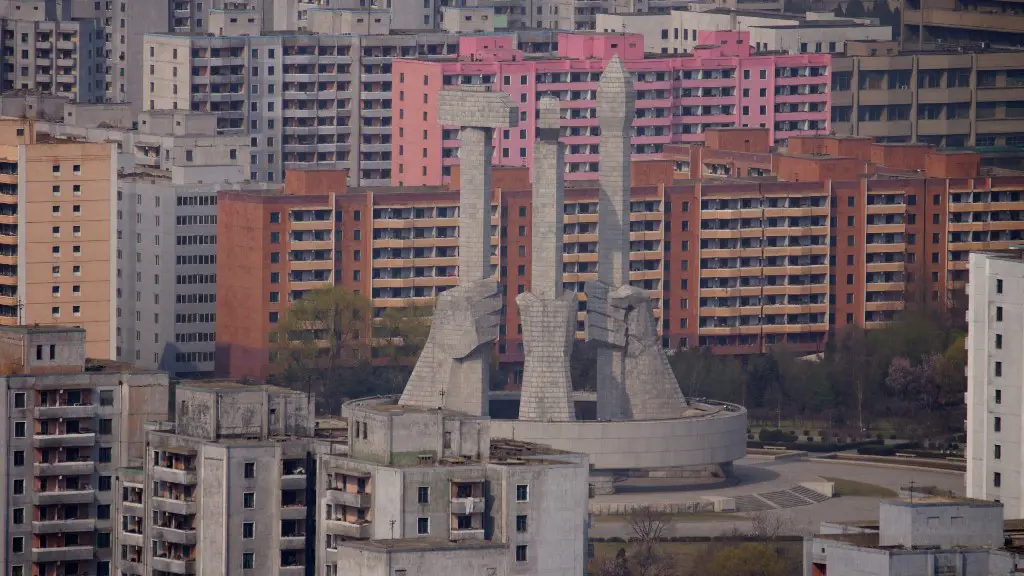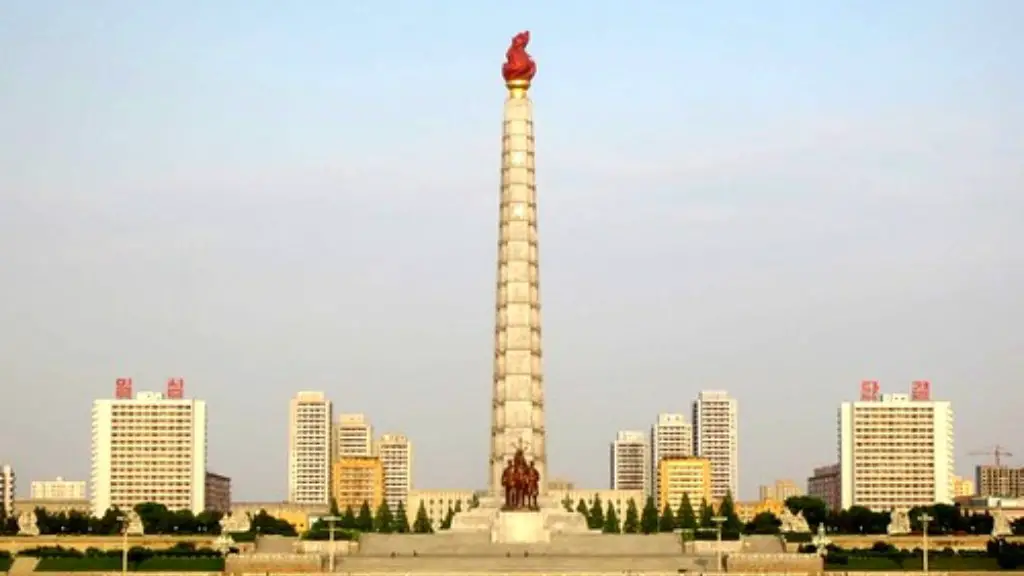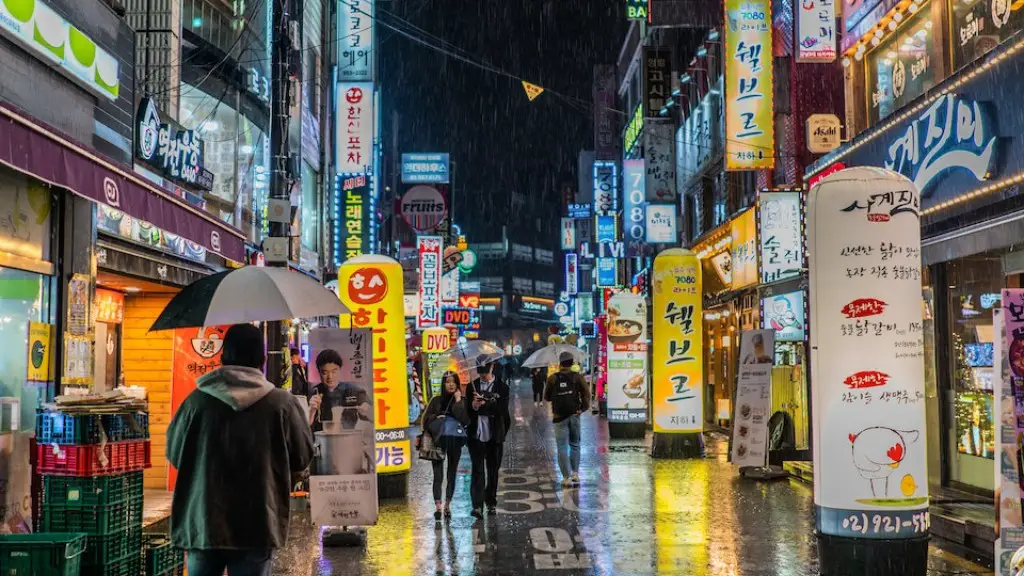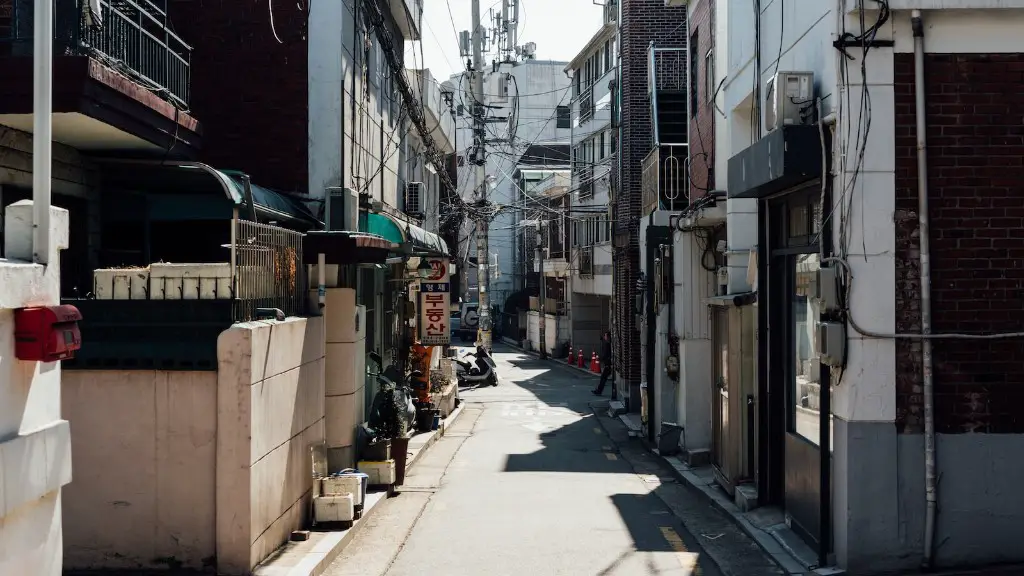What it’s like to be in North Korea is not a topic that can be easily summarised. It’s an isolated country currently governed by an authoritarian regime. Geographically, North Korea is located in eastern Asia, and it is bordered by China and South Korea. It has a population of around 25 million people with a total area of around 120,000 kilometers squared. A growing sense of international intrigue has been directed at North Korea in the recent past, particularly regarding its nuclear capabilities. Such speculation has led to questions being raised about life in the secretive state.
The North Korean government is known for imposing tight controls over its citizens, and its policies have been heavily criticised by both rights groups and the international community. To begin understanding the situation in North Korea, it is important to have an understanding of the government’s authoritarian rule and its impact. Freedom of movement is heavily restricted within the country, with citizens not being able to freely enter or leave the country depending on their situation. The country also has a de facto national religion, Juche or Kimilism, which has been strongly enforced by the North Korean authorities. North Korea is known for its censorship of media, and any form of dissent is not tolerated.
The economic situation in North Korea is not a positive one, with reports of food shortages and poverty leading to a growing humanitarian crisis. In addition, it has been alleged that some of the money received from international aid has made its way to the military, instead of being diverted to food programs. There is also evidence of a thriving black market in the country, with evidence of illegal smuggling occurring, particularly in cities near the Chinese border. Life expectancy in North Korea is also low, with a 2018 report indicating that it was around 66 years of age, compared to 81 years of age for neighbouring South Korea.
The impact of sanctions imposed by the international community has had a major impact on North Korea. The sanctions seek to target sectors of the North Korean economy which the government relies upon for funding, particularly oil and coal imports. As a result, North Koreans have had to face increasing levels of poverty and deprivation. It is also alleged that the North Korean authorities have imposed tougher restrictions on people’s lives and livelihoods. Such restrictions have been particularly hard felt in rural and urban areas, where access to food, medical care and other basic necessities is limited and expensive.
One of the most surprising elements of life in North Korea is the lack of access to the outside world. As mentioned earlier, censorship of media is highly regulated, and access to the internet is heavily restricted. This means that citizens are not exposed to information and ideas from the outside world, making it difficult to form an unbiased opinion about their own country. In addition, citizens are encouraged to participate in mass events and rallies in support of the state, which often involve compulsory attendance. Such restrictions, combined with the lack of access to the outside world, limit the ability of people in North Korea to enjoy the same opportunities and perspectives as those living abroad.
Despite being a mythical place for many people, it is important to note that many North Korean citizens face difficulties in their day to day lives. Reports indicate that most North Koreans depend on subsistence farming as their primary source of livelihood, meaning they are highly vulnerable to crop failures or droughts. In addition, access to education is limited, with schoolchildren having to spend long hours at their studies and often graduating without many job prospects. Discrimination on the basis of social class, ethnicity and gender is also a problem in North Korea.
Oppressive Media in North Korea
The North Korean government has long used media for oppressive politics and propaganda. State media has long been a powerful tool for the ruling party to shape public opinion in the isolated nation. North Koreans, who have only limited access to the internet, have to depend on state-run media for information. The media often carries the government’s version of national events and its messages of loyalty and national pride. For instance, North Koreans are taught to be proud of the regimes’ nuclear weapons program and North Korea’s embrace of socialism.
In addition, media also serves to inform North Koreans of official policy and reinforces loyalty to the regime. This is done by regularly featuring articles on the achievements of the government, its leaders and its policies. Such articles often feature glorified descriptions of life in North Korea, which can contrast sharply with the reality experienced by many citizens. The government’s control over the media has been further bolstered by its harsh punishments against those who violate the regime’s censorship rules.
Consumer goods in North Korea
Although citizens of North Korea are facing undernutrition, poverty and limited access to goods, consumer goods are increasingly becoming available in certain areas. In addition to goods produced domestically such as agricultural produce, goods from other countries such as China, Russia and Japan have also become available. Such goods include consumer electronics, homeware, clothing and other household items. There are a few markets in North Korea that have flourished in the past years and become popular among the citizens.
These markets have a great deal of influence and are one of the few places in North Korea where individuals can purchase consumer goods or services. The markets, which remain open seven days a week, have become a sort of safety valve for the state’s economic woes. An increased availability of consumer goods and services at these markets has made them increasingly popular among North Koreans. Despite the government’s attempts to crack down on such services, many are still offering goods and services with relative immunity.
Leisure Activities in North Korea
One of the areas the North Korean government has sought to heavily regulate is the realm of leisure activities. In particular, the authorities have sought to limit celebrations and gatherings, such as birthday parties, in efforts to discourage people from gathering. They have also sought to limit activities such as watching foreign films and accessing certain types of technology such as computers or gaming devices. In addition, authorities have also sought to limit contact with outsiders including religious groups, political activists and international media.
The government has also prohibited the consumer of certain recreational drugs and alcohol, with severe punishments for those caught in possession. Furthermore, the government has sought to limit access to leisure activities in public spaces, and people have been discouraged from gathering in groups. This has been done in attempt to discourage activities deemed dangerous or subversive by the government, such as pro-democracy demonstrations.
The Situation for Foreigners in North Korea
Foreigners wishing to enter North Korea must abide by strict regulations and obtain special permits. Conditions for entry into the country depend on the person’s country and purpose of visit. One of the major restrictions that foreigners must abide by is that they must be accompanied by a North Korean guide, which limits their independence and freedom of movement. In addition, foreign nationals must adhere to their own country’s laws whilst in North Korea.
The situation for foreigners within the country is quite different to that of citizens. Generally, foreign nationals will have access to a different standard of living. They are not subjected to the same levels of government monitoring or regulation as citizens are, and will often have access to better medical care, food and housing. Whilst in North Korea, foreigners must avoid engaging in any political or subversive activities, or they face the risk of being arrested or deported. Foreigners must also be aware of the country’s strict laws prohibiting contact with North Korean citizens, and must not contact or interact with citizens without permission.
Lack of Civil Liberties in North Korea
Civil liberties in North Korea are greatly restricted. Freedom of expression and opinion is strictly censored by the government, and citizens are encouraged to express loyalty to the state and its leaders. Any form of dissent is heavily suppressed, and severe punishments, including imprisonment or death, can be meted out for any perceived offenses. Citizens are also discouraged from participating in activities deemed by the government to be politically or ideologically subversive.
The North Korean authorities also maintain rigid control over citizens’ personal lives. Citizens are not allowed to move or travel freely, and face severe punishment for any perceived transgressions such as attempting to leave the country. People must also seek permission to marry and start families, and those deemed to be pursuing politically subversive activities may face punishment. This has included the ‘re-education’ of those accused of such activities, as well as the possible separation of families.
The North Korean government has also been accused of arbitrary detention and torture of detainees. Reports have emerged in the media of prisoners being subject to torture and ill-treatment, with many being arbitrarily detained in political prison camps. Political prisoners have been said to be subject to inhumane conditions and cruel treatment. There are also reports of forced labour, with detainees being required to perform hard labour in dangerous and life-threatening conditions.
North Korea Nuclear Weapons Program
The North Korean government has long had an agenda of pursuing nuclear weapons. This follows the logic of many other countries looking to international power and influence. North Korea has continued to develop its nuclear capabilities in spite of strong international condemnation about its intentions. In addition, there are doubts about the government’s ability to even control the technology it possesses.
The North Korean nuclear weapons program has been a major focus of international attention in the past few years. US President Donald Trump has famously met with Kim Jong Un in an attempt to negotiate the disarmament of North Korea. Despite some progress being made, North Korea has been reluctant to fully disarm. This has resulted in heightened tensions between the US and North Korea, as well as the international community.
The international community has attempted to persuade North Korea to abandon its nuclear program through economic sanctions and threats of military action. However, such efforts have so far failed, and the situation remains inconclusive. The world may soon face a situation where North Korea is a fully-fledged nuclear power, and the international community is scrambling for a solution to the crisis.
The Effects on the North Korean people
The nuclear advancement of North Korea has meant a great strain on the country’s resources, with the money and energy being used for the nuclear program coming out of the pockets of the North Korean people. This has often been at the expense of social services, such as medical care, infrastructure and education, as the government has diverted its resources towards the nuclear program. This has also been further cemented by the international sanctions imposed against the country, which have limited its trade and resources, impacting the lives of citizens negatively.
In addition, the government’s advancement of its nuclear program has also generated a great deal of fear among the citizens. With an increased threat of a nuclear missile attack constantly looming, this has had an effect on the psyche of citizens, as they fear for their safety. The fear of attack has also been amplified by the increasingly hostile nature of international relations with North Korea.
Furthermore, the political feuds between the countries of the world and the North Korean government has often been a major source of tension for North Koreans. This has sparked outbursts of protests from the citizens, with the government often threatening or even using violence to put an end to them. This has further impacted the lives of citizens, as they are living in a state of fear and uncertainty.
